- Home
- Mosley, Walter
And Sometimes I Wonder About You : A Leonid Mcgill Mystery (9780385539197)
And Sometimes I Wonder About You : A Leonid Mcgill Mystery (9780385539197) Read online
Also by Walter Mosley
Leonid McGill Mysteries
All I Did Was Shoot My Man
When the Thrill Is Gone
Known to Evil
The Long Fall
Easy Rawlins Mysteries
Rose Gold
Little Green
Blonde Faith
Cinnamon Kiss
Little Scarlet
Six Easy Pieces
Bad Boy Brawly Brown
Gone Fishin’
A Little Yellow Dog
Black Betty
White Butterfly
A Red Death
Devil in a Blue Dress
Other Fiction
Stepping Stone / Love Machine
Merge / Disciple
The Gift of Fire / On the Head of a Pin
The Last Days of Ptolemy Grey
The Tempest Tales
The Right Mistake
Diablerie
Killing Johnny Fry
Fear of the Dark
Fortunate Son
The Wave
47
The Man in My Basement
Fear Itself
Futureland: Nine Stories of an Imminent World
Fearless Jones
Walkin’ the Dog
Blue Light
Always Outnumbered, Always Outgunned
RL’s Dream
Inside a Silver Box
Debbie Doesn’t Do It Anymore
Original E-books
Parishioner
Odyssey
Jack Strong
The Further Tales of Tempest Landry
Nonfiction
12 Steps Toward Political Revelation
This Year You Write Your Novel
Life Out of Context
What Next: A Memoir Toward World Peace
Workin’ on the Chain Gang
Plays
The Fall of Heaven
This book is a work of fiction. Names, characters, places, and incidents either are the product of the author’s imagination or are used fictitiously. Any resemblance to actual persons, living or dead, events, or locals is entirely coincidental.
Copyright © 2015 by Thing Itself, Inc.
All rights reserved. Published in the United States by Doubleday, a division of Penguin Random House LLC, New York, and distributed in Canada by Random House of Canada, a division of Penguin Random House Ltd., Toronto.
www.doubleday.com
DOUBLEDAY and the portrayal of an anchor with a dolphin are registered trademarks of Penguin Random House LLC.
eBook design adapted from book design by Michael Collica
Cover design by Michael J. Windsor
Cover photographs: man © Martin Barraud / Getty Images; manhole © Danger Jacobs / Shutterstock; background © Eugene Sergeev / Shutterstock
Library of Congress Cataloging-in-Publication Data
Mosley, Walter.
And sometimes I wonder about you : a Leonid McGill mystery / Walter Mosley.
pages ; cm
ISBN 978-0-385-53918-0 (hardcover)—ISBN 978-0-385-53919-7 (eBook) 1. McGill, Leonid (Fictitious character)—Fiction. I. Title.
PS3563.O88456A82 2015
813'.54—dc23
2014044246
eBook ISBN 9780385539197
v4.1
ep
Contents
Cover
Also by Walter Mosley
Title Page
Copyright
Dedication
Chapter 1
Chapter 2
Chapter 3
Chapter 4
Chapter 5
Chapter 6
Chapter 7
Chapter 8
Chapter 9
Chapter 10
Chapter 11
Chapter 12
Chapter 13
Chapter 14
Chapter 15
Chapter 16
Chapter 17
Chapter 18
Chapter 19
Chapter 20
Chapter 21
Chapter 22
Chapter 23
Chapter 24
Chapter 25
Chapter 26
Chapter 27
Chapter 28
Chapter 29
Chapter 30
Chapter 31
Chapter 32
Chapter 33
Chapter 34
Chapter 35
Chapter 36
Chapter 37
Chapter 38
Chapter 39
Chapter 40
Chapter 41
Chapter 42
Chapter 43
Chapter 44
Chapter 45
Chapter 46
Chapter 47
Chapter 48
Chapter 49
Chapter 50
Chapter 51
Chapter 52
Chapter 53
About the Author
For Carine Desir, who shares my cracked view of the world
1
Taking the local train from Philly to New York’s Penn Station may not be as smooth as the Acela’s ride but it gets the job done for a few dollars less and sometimes, like that Monday afternoon, the car is nearly empty and a man has time to think.
My nearest neighbor across the aisle was a slim and dapper gentleman, well past retirement and dressed in an out-of-season white seersucker suit with light blue pin-striping. It was cool that fall and he would have done well with a heavier fabric, but maybe that was just the octogenarian’s style—or maybe his only suit. He was napping, talking in his sleep. The unintelligible words came from his lips like a sporadic spoken-word song in another language. Maybe it was a foreign tongue.
Six rows back, I knew, sat a behemoth of a man wearing black-jean overalls and a heavy, long-sleeved blue-and-white-checkered work shirt. From a thick steel chain around the big man’s neck depended a real horseshoe that had never been attached to any hoof. The man was in his forties, over four hundred pounds, with red hair and the raspberry and cream–colored skin of a Norseman. His regular breathing, when you got within two rows, was loud enough to hear over the clacking of metal wheels on metal tracks.
At the front of the car, in a seat facing backward, there perched a small black woman who was somewhere around my age, clutching a red, yellow, and green calico carpetbag by its worn brown leather handle. The fifty-something lady looked worried but this seemed like a regular state of affairs—not any specific problem that plagued her at that point in time.
Specific problems have always been my stock-in-trade. As a young man I delivered this unwanted commodity; nowadays I remove it—for a price.
A woman came through the semiautomatic door behind the worried grandmother. This potential new resident of our low-occupancy car was harder to define.
She was beautiful. Her bright skin was the russet brown I associated with the Caribbean, her hair was untreated and a little wild, and her eyes a color somewhere between brown and bronze. I noticed her eyes because this was the third time she’d gone past gazing at me, considering, and then rejecting whatever thought it was that those eyes harbored. Past thirty but nowhere near the next decade, she’d still be lovely when she reached the age of the sleeping man who muttered across the aisle.
I wondered what she might have asked if I had met her expectations. This thought caused me to look around just in time to see her stop at the behemoth’s row. She asked a question and he grumbled something. She asked something else and he shook his head vehemently, gestured with his left hand, and
then turned away—which was no mean feat for a man his size.
She nodded at him, almost a bow, and made her way to the end of the car. There she punched the chrome plate that engaged the sliding door.
The passing thought that it might have been nice to hear her question firsthand was soon displaced by the certainty that whatever she said would not have improved my life. In my experience beautiful strangers rarely give as much as they take and they almost always ask for more.
After she was gone I pulled out my cell phone and entered the characters M-A-R, then touched a button that had the image of an upright receiver emblazed upon it. The phone rang once and she answered.
“McGill and Son detective agency.”
I had never asked her to answer the phone like that but Mardi had her own aesthetic and she had become, in just a few years, an indispensable part of my office.
“Hey, Mardi.”
“Mr. McGill. How are you?” Her voice was soft like a satin finish on polished steel.
“Just fine. I get anything on my New York Literary Review ad?”
“No, sir. I checked just this noon.”
I didn’t expect an answer. William Williams was in the wind. It was no great loss; like the dollar bet on a hundred-million-dollar Lotto—you were bound to lose but you had to play.
“A man named Hiram Stent called asking for an appointment anytime today,” Mardi murmured.
“What’s his problem?”
“He didn’t say but it sounded pretty, I don’t know…urgent.”
“I’m not coming in today,” I said. “I’m going straight to the sanatorium from the station. Give him a morning slot, first thing.”
“Yes, sir. Are you finished with the Martinez case?”
“Yeah.”
“Did it turn out okay?”
“He ran once,” I said. “Who’s to say he won’t do it again? Twill in?”
“No,” she said but her tone said more.
“Where is he?”
“He didn’t call in today. I think he’s probably at home studying the tapes you had me give him.”
There was something off in Mardi’s voice, something that had to do with my favorite son. I would have asked about it but just at that moment I felt a presence at my side. Looking up, I saw the brilliant vision of the beautiful woman who flitted around our car like a hesitant butterfly over a sticky flower.
Her dress was a shade deeper than coral, and though it wasn’t tight it expressed her figure just fine.
“I’ll have to call you back, M, something just came up here.”
“On the train?”
“No problem,” I said, “just somebody wanting a section of my paper.”
“See you tomorrow,” she said, and I broke the connection.
“Hello,” I greeted while putting the phone in the breast pocket of my all-purpose blue suit.
“I didn’t mean to interrupt you,” she said. Her voice was somewhere in the lower register of gold. Her black satin purse was cinched at the top like a miniature burlap potato sack.
“No problem. I was just calling in to the office.”
“Oh.” She glanced at the door behind her. “Um…can I sit next to you?”
I was on the aisle so she was asking for a window seat—with a buffer.
“Is that what you asked Haystack Calhoun back there?”
She didn’t get the cultural reference but still understood the joke. Smiling and frowning at the same time, she said, “I think he’s afraid of girls.”
“Good for him. Some men never learn that lesson.”
“Have you?” the nameless beauty asked.
If I believed in angels they wouldn’t be the sweet beneficent kind with fluffy wings and halos but rather haughty, removed Valkyries that tore the soul from your dying breast. That kind of angel would have asked the question she put to me. And, I knew, I should have answered like the colossus with the horseshoe necklace.
“My name’s Leonid,” I said, “Leonid McGill.”
“May I sit on the other side of you, Mr. McGill?” she asked.
If I wanted her name I was going to have to work for it.
I grabbed my brown rucksack from the empty seat next to me and then stood making a gesture with my left hand, the same and yet the opposite of the behemoth. She smiled and brushed past me. At that proximity I got a whiff of something both acrid and sweet, like some ancient forests I’d been in. It was a mild scent that caused a strong reaction in a section of my heart that had almost been forgotten.
When she was installed there next to me I knew that the next week or so would be trouble. I smiled and laughed a little. She nodded and then grinned.
2
“What kind of work do you do?” she asked, turning in her leather seat and lifting her right ankle up under the left thigh. That way she could look at me while watching both ends of the nearly empty car.
“There’s a guy named Eddie and a woman named Camille,” I said.
My new neighbor leaned back against the window and smiled. She didn’t mind hearing a roundabout answer.
“Eddie is, or at least he was, a what you call undocumented laborer from Central Mexico, a farmer that could read and write. Camille is an investment banker, more Madison Avenue than Wall Street.”
“What’s the difference?” my temporary companion asked.
“What’s your name?” I replied.
That turn got her to grin. She looked both ways down the aisle like a cautious pedestrian and said, “Marella. Marella Herzog.”
“Interesting name,” I mused. “Where’s it from?”
“I think the origin for Herzog is German.” Her smile was as opaque as the answer. “Marella is Italian.”
“Wall Streeters are solitary sharks, Marella,” I said, relishing the name. “Madison Avenue is populated by social animals—mostly wolves.”
“What about Eddie and Camille?” she asked.
“At the same time and in very different spheres Camille and Eddie got tired of their roles in life. She began doing charity work, not giving money but rolling up her sleeves and going down to shelters. She also represented dozens of undocumented laborers in court—gratis.
“Around then, Eddie was honing his English, becoming a florist’s assistant, and studying for his citizenship exam.”
“Don’t tell me,” Marella said. “He was arrested by the INS and she got his case.”
Before I could answer, Marella looked up suddenly, seeing something at the front of the car. I turned my gaze and saw a tall, olive-skinned man with a scar along the right side of his nose like an editor’s diacritical marking. He was wearing a long-sleeved black shirt and gray slacks. Slender and likely strong, he reminded me of an unsheathed hunting knife—both haft and blade.
I say “tall” because he was a shade or two over six feet, but really most American men are tall compared to me. I’m half an inch under five and a half feet. What I lack in height I like to think I make up for in muscle. I weigh one eighty-three most mornings and not too much of that is fat.
The taller man’s body didn’t slow down as he passed our aisle but his eyes did. Those dark slits took her in—glanced at, and then dismissed, me. He didn’t look crazy and so I remained calm.
When he passed through the back door of the car I said, “No. Eddie brought a woman from his Bronx apartment building to Camille’s after-hours, downtown office on Bowery.”
The woman calling herself Marella Herzog took in a deep breath through her nostrils and looked back at me with what I can only call a bit of pride.
“And he spoke such perfect English that she fell in love with him,” she said.
“Something like that. Eddie knew a world that offered her something, and she was like the Statue of Liberty as far as he was concerned. They shared intelligence, he passed his citizenship test, and she stopped worrying about where banking could take her. It was like a multicultural fairy tale until about a month ago.”
“So you’re a marria
ge counselor?” Marella guessed.
“One morning Camille woke up in her Park Avenue South condo and found Eddie gone. He’d taken with him his four pairs of cotton pants, six shirts, shoes, and toothbrush.”
“You’re a PI.”
“She called me after the police told her that it was just a man leaving a woman. I found a trail of calls and a few bills that led me down to Philly. I spent the week in the City of Brotherly Love buying roses. It took longer than I expected because Eddie had opened his own kiosk in Reading Terminal Market. I talked to him about Mexico in my best Cuban Spanish and he said that he loved it in America. After fifteen minutes of yacking I told him that I worked for Camille and that she wondered why he ran away.”
“What did he say?” I think at that moment she had almost forgotten the olive-skinned hunter that had marked her with his slow eyes.
“People were always looking at him,” I said. “White people, other Mexicans, policemen. He had started to feel that he didn’t belong with Camille or in her world. He felt that he brought nothing to the table and the table belonged to her.”
“Wow,” she said, pursing her well-formed dark lips. “That’s some kinda man, huh?”
“I told him that my father told me that the first thing a farmer learns is that the man doesn’t own the soil but the earth owns him. The same thing, I said, was true of tables and monies and fancy streets.”
“Your father sounds like a wise man.”

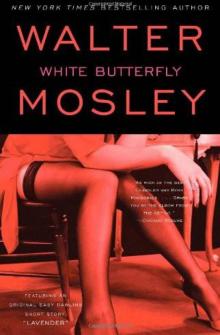 White Butterfly
White Butterfly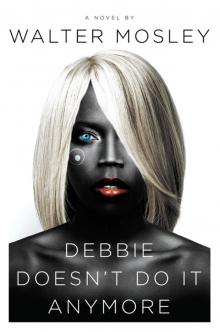 Debbie Doesn't Do It Anymore (9780385538398)
Debbie Doesn't Do It Anymore (9780385538398)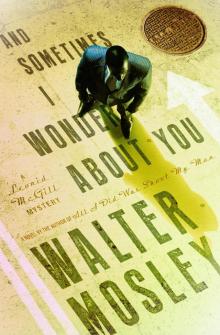 And Sometimes I Wonder About You : A Leonid Mcgill Mystery (9780385539197)
And Sometimes I Wonder About You : A Leonid Mcgill Mystery (9780385539197)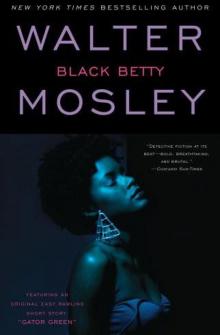 Black Betty
Black Betty All I Did Was Shoot My Man
All I Did Was Shoot My Man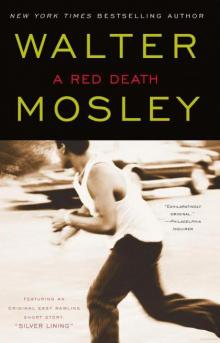 A Red Death
A Red Death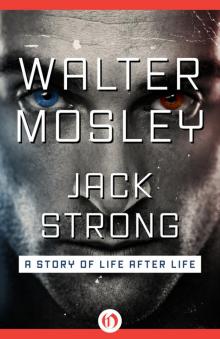 Jack Strong: A Story of Life After Life
Jack Strong: A Story of Life After Life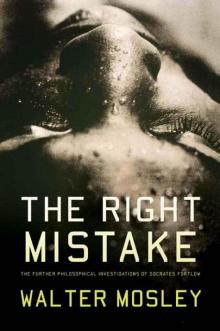 The Right Mistake
The Right Mistake